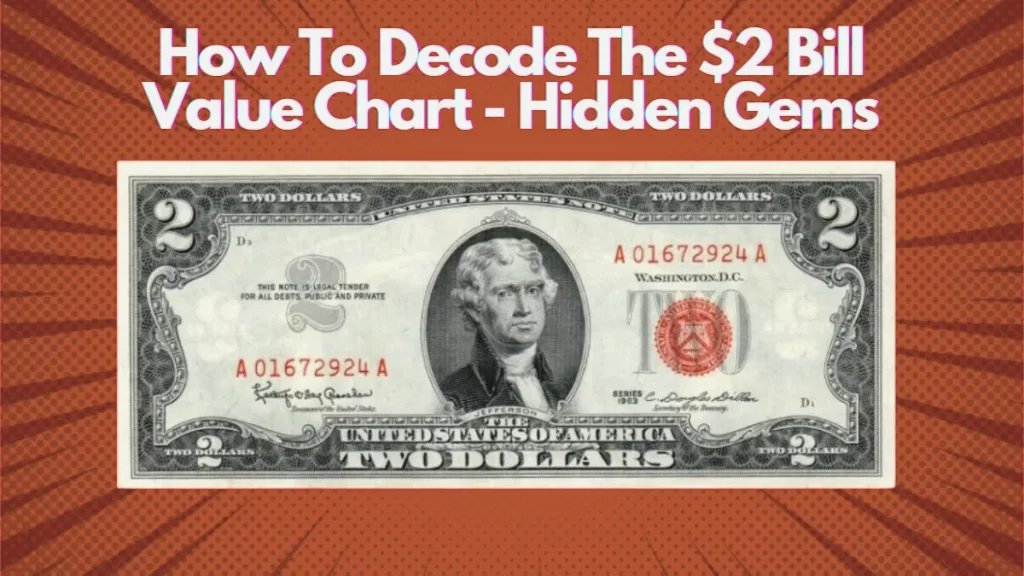Decoding the $2 Bill Value Chart can seem like a daunting task for collectors and enthusiasts alike. With the potential for hidden gems and valuable notes, understanding how to navigate this chart is crucial for anyone looking to maximize their collection’s worth. This guide will delve into the key aspects of the $2 Bill Value Chart, highlighting what to look for and how to spot valuable bills that may be tucked away in your wallet or collection. By the end of this article, you’ll be equipped with the knowledge to identify the true value of your $2 bills, ensuring you never miss out on a rare find.
Understanding the Basics of the $2 Bill Value Chart
The $2 Bill Value Chart serves as a comprehensive reference for collectors, detailing the various factors that influence the worth of $2 bills. Familiarizing yourself with the chart is the first step in recognizing the potential value of your bills. The chart provides a clear breakdown of prices based on condition, rarity, and unique features.
Factors Influencing Value
Several factors can affect the value of a $2 bill. These include the bill’s condition, its series year, and any unique markings or errors. Understanding these factors will help you assess your collection more accurately and identify which bills may be worth more than face value.
Identifying Rare Series
Certain series of $2 bills are considered rarer than others, significantly impacting their value. Bills from earlier series, particularly those printed before 1976, tend to be more sought after. Knowing which series to look for can help you pinpoint potentially valuable bills in your collection.
Grading the Condition of Bills
The condition of a $2 bill plays a crucial role in determining its value. Collectors use a grading scale that ranges from uncirculated to heavily circulated. Learning how to properly grade your bills will allow you to make informed decisions about their worth and whether they should be preserved or sold.
Spotting Misprints and Errors
Misprints and errors can dramatically increase a bill’s value. This section will cover how to identify common printing errors, such as misaligned designs or incorrect serial numbers. Understanding these nuances can lead you to discover bills that are significantly more valuable than others.
Market Trends and Demand
The market for collectible currency can fluctuate based on demand and trends. Staying informed about current market conditions can help you decide the best time to buy or sell your $2 bills. This section will provide insights into how to track market trends effectively.
Resources for Collectors
Numerous resources are available for collectors looking to deepen their understanding of the $2 Bill Value Chart. Books, online forums, and collector groups can provide valuable information and support. Utilizing these resources can enhance your collecting experience and help you build a more valuable collection.
| Factor | Description | Impact on Value | Example | Notes |
|---|---|---|---|---|
| Condition | Overall state of the bill | High | Uncirculated bill | Preservation is key |
| Series Year | Year the bill was issued | Medium | 1976 series | Older series are often worth more |
| Errors | Misprints or mistakes | Very High | Misaligned print | Rarity increases value |
| Market Demand | Current interest in the bill | Variable | High demand for certain series | Stay updated with trends |
Being well-informed about the nuances of the $2 Bill Value Chart is essential for any collector aiming to enhance their collection. By understanding the various factors that influence a bill’s value, you can make more informed decisions and potentially uncover hidden treasures in your collection.
FAQs
What is the most valuable $2 bill?
The most valuable $2 bills are typically those that are uncirculated and from rare series, particularly those printed before 1976. Certain misprints can also significantly increase a bill’s value.
How can I tell if my $2 bill is rare?
To determine if your $2 bill is rare, check its series year, condition, and look for any printing errors. Bills from earlier series or with unique features are generally more valuable.
Where can I find more information about $2 bills?
You can find more information about $2 bills in collector guides, online forums, and books dedicated to currency collecting. Engaging with collector communities can also provide valuable insights.
Is it worth selling my $2 bills?
If your $2 bills are in good condition or belong to a rare series, it may be worth selling them. Researching current market values will help you make an informed decision.


